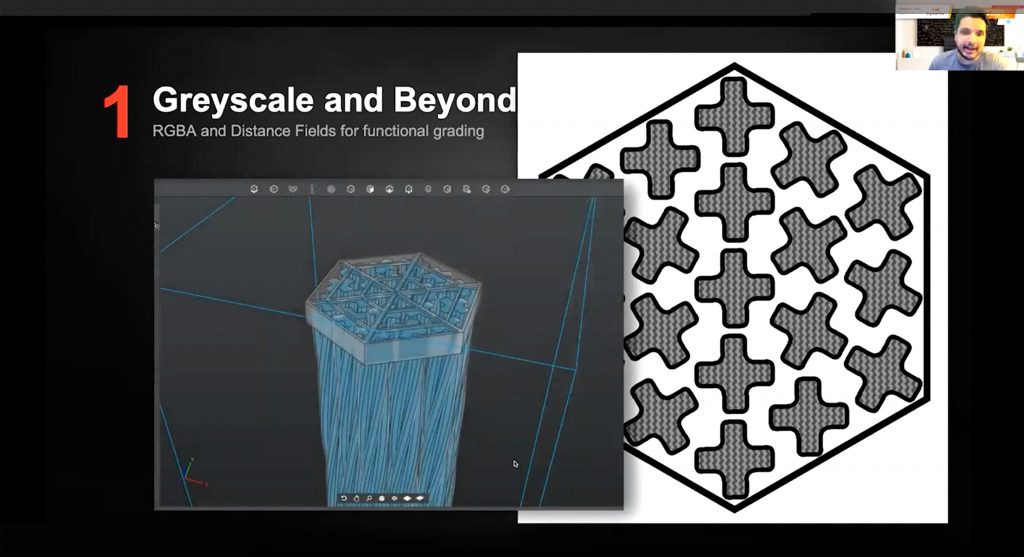3D printing software developer Dyndrite has launched a set of new software APIs enabling 3D printer manufacturers to more easily implement advanced features such as support-free 3D printing.
Developed in collaboration with the company’s OEM customers, partners, and members of the Dyndrite Developer Council (DDC), the new toolsets are now available as part of the Dyndrite Accelerated Computation Engine (ACE) Toolpathing API. Primarily targeted at smaller-scale manufacturers with limited funding and resources, the tool sets can also be used to develop anisotropic compensation, greyscale and metadata part slicing, and more.
Steve Walton, Head of Product at Dyndrite, said, “We are democratizing the critical compute software layer needed for continued innovation in additive manufacturing. This is a step change for software in the AM industry. We are providing a math department so everyone can benefit from the emergence of new solutions.”

Who needs Dyndrite’s APIs?
Before the emergence of geometry kernels like ACIS and Parasolid back in the 1980s, computer hardware manufacturers like IBM and Computervision had to develop their proprietary CAD-capable computers from scratch. This made them pricey and inconsistent in terms of performance, and resulted in high barriers to entry into the workstation market.
Once geometry kernels became mainstream, anyone could license the 3D tools necessary to develop high-performance CAD/CAM software. This meant that new players could begin launching affordable 3D CAD/CAM applications which ran sufficiently on lower-end PCs. In essence, these kernels ‘democratized’ 3D CAD/CAM software by providing the fundamental mathematical tools necessary to enable new software innovation.
Four decades on, most 3D software is still developed using these geometry kernels, including additive manufacturing software. According to Dyndrite, however, these kernels aren’t tuned to the complex mathematical geometry and computing hurdles presented by additive manufacturing processes.
This makes the development of algorithms for features such as for voxel processing with metadata and grayscales, the use of distance fields for geometry interrogation and segmentation, lattices, and support-free 3D printing extremely difficult. This is especially true for smaller-scale OEMs and startups, which typically don’t have the resources required to build out a dedicated software development department.
The Dyndrite ACE Toolpathing API is designed to solve this issue, providing an accessible route to 3D printing software development without the associated costs.

The Dyndrite ACE Toolpathing API
The Toolpathing API is compatible with both raster and vector 3D printing processes, and now includes three new toolsets: control over RGBA and distance fields for functional grading in raster processes, anisotropic compensation in raster processes, and support-free metal 3D printing via field-based segmentation. Dyndrite also provides consultation services to assist customers in evaluating and implementing the APIs.
The first of the new tool sets streamlines the process of calculating grayscales in voxels, allowing customers to determine key part segmentation, create useful metadata to fine-tune the fundamental physical machine process, and control functionally-graded parts at the voxel level. As far as applications go, this toolset is designed to help 3D print multi-material part families such as induction coils, heat exchangers, wear pads and indicators.
Next up is the anisotropic compensation tool set, which is designed to enable toolpath adjustments that account for the printing direction, the recoating direction, and the direction that the deposition/fusing tool travels in. It is currently only compatible with binder jet and photopolymer processes, but is being expanded to other 3D printing technologies.
Finally, the last new tool set is intended to help develop support-free metal 3D printing, a feature that saves on material costs and vastly simplifies the post-processing stage of production. The Dyndrite API works by segmenting the part at resolutions finer than the minimum feature size, thus allowing unique support-free processing parameters to be assigned to different volumes within a part.
As Dyndrite is no doubt aware, software is just as important as hardware when it comes to advancing industrial additive manufacturing. Just this month, 3D printing software developer 3YOURMIND was awarded a contract by the Naval Information Warfare Center (NIWC) Pacific to provide the US Navy with a seamless digital production workflow to enable distributed additive manufacturing.
Over in the design space, engineering software developer Autodesk recently announced a huge price reduction of 80% for the Generative Design Extension of its Fusion 360 CAD software. Commercially launched back in 2018 for an annual subscription of $8,000 per year, the extension can now be accessed for just $200 a month or $1,600 a year, making geometrically-optimized 3D printing cheaper than ever.
Nominations for the 2021 3D Printing Industry Awards are now open, have your say in who is leading the industry now.
Subscribe to the 3D Printing Industry newsletter for the latest news in additive manufacturing. You can also stay connected by following us on Twitter, liking us on Facebook, and tuning into the 3D Printing Industry YouTube Channel.
Looking for a career in additive manufacturing? Visit 3D Printing Jobs for a selection of roles in the industry.
Featured image shows the support-free metal 3D printing toolset. Image via Dyndrite.



